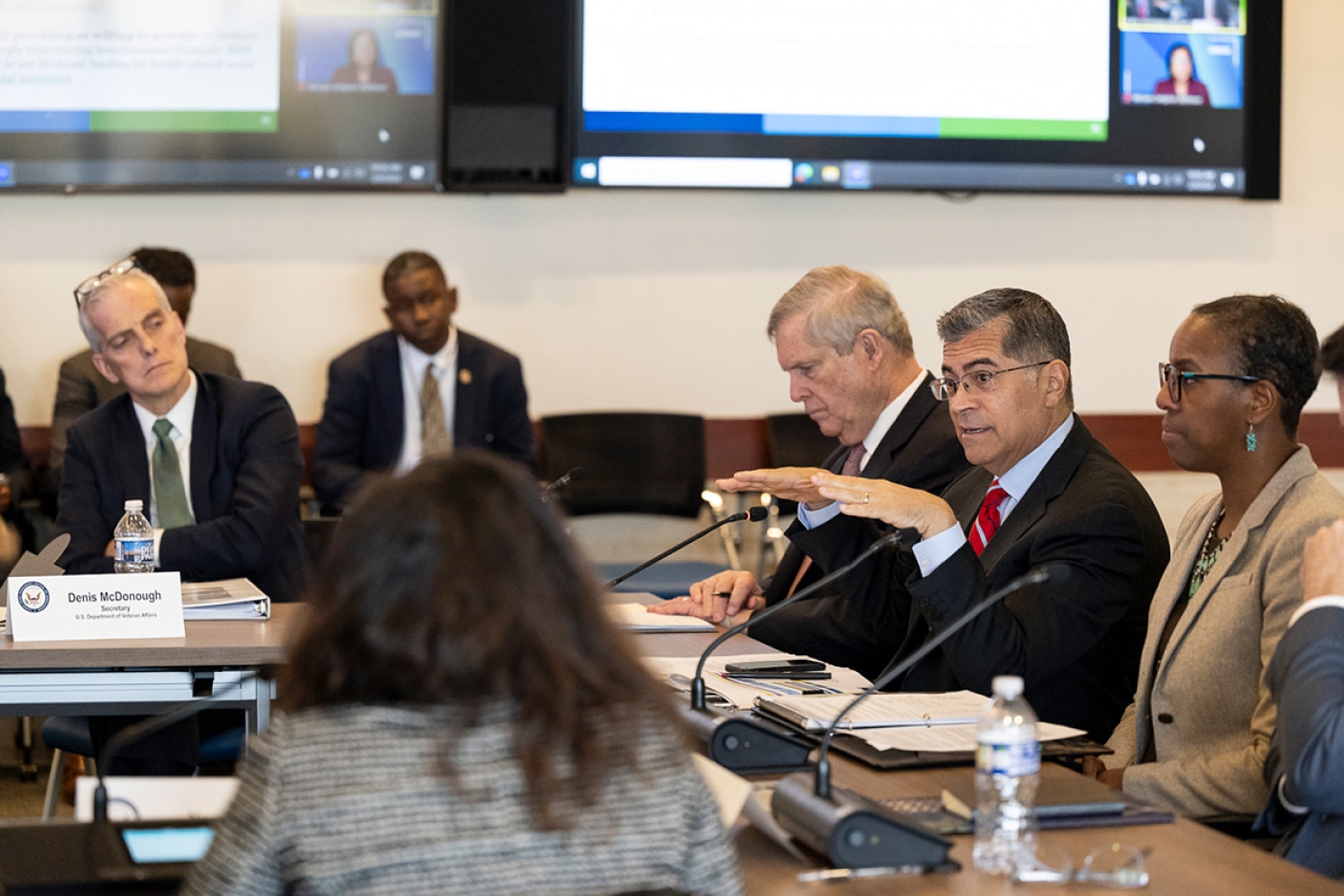At USICH Meeting, Council Focuses on Innovative Solutions for Homelessness and Mental Health
Under the new leadership of Health and Human Services (HHS) Secretary Xavier Becerra, the U.S. Interagency Council on Homelessness (USICH) met this month to discuss how the federal government can provide more support for innovative state and local efforts to meet the needs of people experiencing both homelessness and mental health or substance use disorders.
Mental health and substance use disorders are often exacerbated by the harsh realities of living without a home, and they make it harder for a person to find and maintain shelter and housing. Many shelters and temporary housing programs have sobriety requirements that exclude people who are struggling with addiction, leaving them nowhere to go but outside.
“The evidence is clear: When you’re sick, having a safe home can give someone the safety and peace of mind to focus on getting well,” said HHS Secretary Becerra, who was elected chair of USICH in October. “Medicaid demonstrations are one way states can improve the health of people that are housing insecure. The waivers make it easier for health providers to reach and treat people where they are—and help them stay well. We encourage more states to apply for these flexibilities as part of a strategy to improve health for those experiencing housing instability.”
At last week’s council meeting, USICH heard from leaders in Arizona and Colorado about their innovative approaches. Denver, for instance, used a social impact bond to provide housing and supportive services to people experiencing homelessness who frequently use city services, such as emergency rooms. The program has decreased ER visits and saved $6,876 per person in annual cost of services. Starting in October, Arizona’s Medicaid plan will cover up to six months of rent for people who are experiencing or at risk of homelessness and suffering from serious mental illness. However, it has been a struggle for people to secure housing vouchers, especially in Phoenix, where the waitlist for housing had been closed for years until recently. As part of the ALL INside Initiative launched last year, USICH and the White House are working with local leaders in both states—Phoenix in Arizona and Denver in Colorado—to further break down barriers to housing, vouchers, health care, and other support for people experiencing homelessness.
Arizona’s approach is made possible because the Biden-Harris administration has granted nearly 10 states the flexibility to use Medicaid to cover the short-term cost of housing to facilitate mental health and substance use treatment for people experiencing homelessness. These flexibilities—which are granted through demonstration projects under Section 1115 of the Social Security Act—are expected to improve health, reduce the need for hospital visits and institutional stays, lower health costs, and help more people exit homelessness.
“I am very appreciative of the Department of Health and Human Services for raising awareness and addressing the connection between behavioral health and homelessness," said Agriculture Secretary Tom Vilsack, the vice chair of USICH. "This is a challenging problem. I'm grateful that USICH has spotlighted rural homelessness, which can sometimes look different from urban areas. No single department can do it alone, and we welcome the opportunity to work collaboratively with leaders across the administration.”
“The lack of affordable housing is a primary driver of homelessness, and while not everyone without a home has a mental health or substance use disorder, many do. We must do everything we can to ensure that people struggling with mental illness or addiction have immediate access to housing, voluntary treatment on demand, and other wraparound supports,” said USICH Executive Director Jeff Olivet. “With housing, health care, and other supports to help people stay housed, homelessness is solvable.”
Medicaid 1115 demonstration projects are only one of the Biden-Harris administration’s many approaches to combatting homelessness, which rose 12% from January 2022 to January 2023, according to the Point-in-Time Count released in December. In just the last year, the federal government helped more than 424,000 exit or avoid homelessness; invested nearly half a billion dollars to address unsheltered and rural homelessness; and laid the foundation in 2023 to build more apartments than any year other on record.
In the few months since becoming USICH’s lead agency, HHS has taken several actions to address homelessness head-on. The department approved New York’s 1115 demonstration project. On Friday, HHS and HUD announced the states selected for the new Housing and Services Partnership Accelerator, which aims to help states develop or expand innovative housing-related Medicaid support and services for people with disabilities and older adults experiencing or at risk of homelessness. HHS’ Administration for Children and Families (ACF) awarded millions to two programs designed to prevent homelessness. ACF released new guidance to help communities leverage HUD’s Foster Youth to Independence Program, which provides rental assistance and supportive services to young adults transitioning out of foster care, who are particularly vulnerable to homelessness.
For more on USICH meetings, click here.



